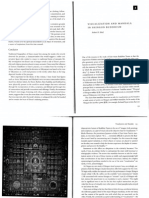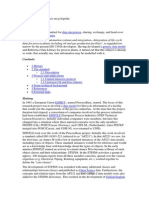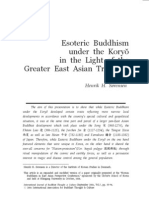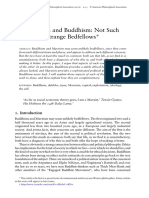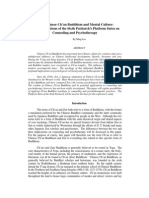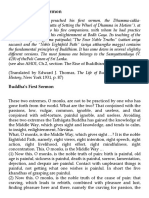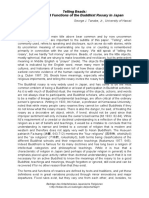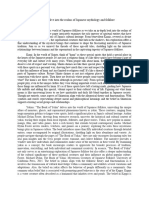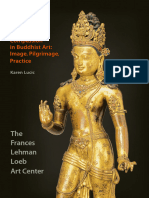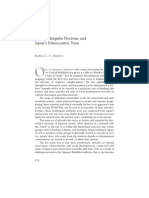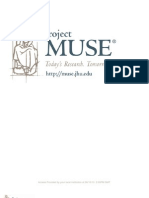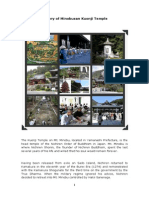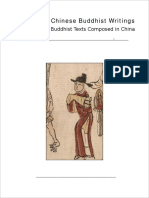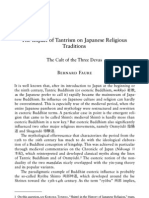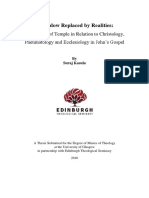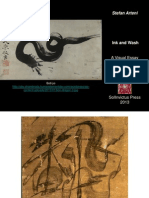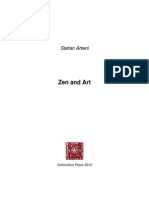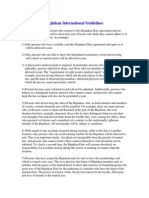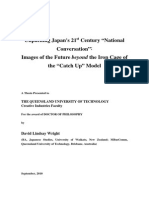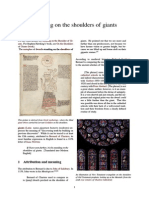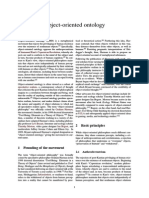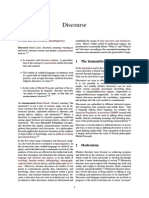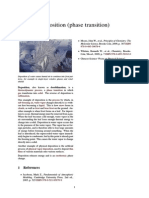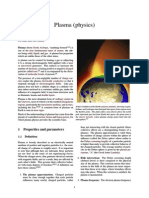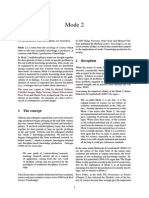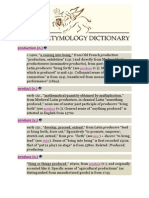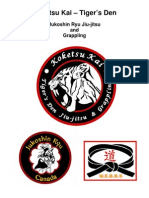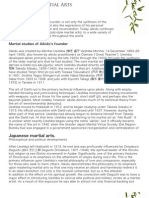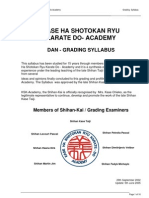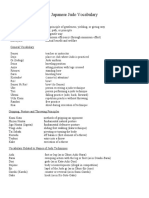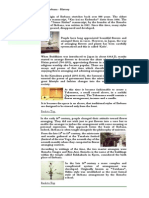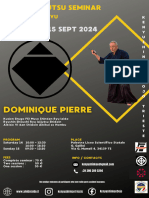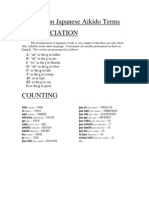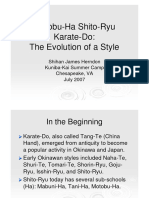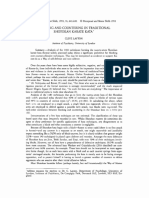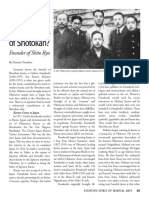Ichi-go ichi-e (一期一会)
Ichi-go ichi-e (一期一会)
Uploaded by
ruin_2832Copyright:
Available Formats
Ichi-go ichi-e (一期一会)
Ichi-go ichi-e (一期一会)
Uploaded by
ruin_2832Original Description:
Original Title
Copyright
Available Formats
Share this document
Did you find this document useful?
Is this content inappropriate?
Copyright:
Available Formats
Ichi-go ichi-e (一期一会)
Ichi-go ichi-e (一期一会)
Uploaded by
ruin_2832Copyright:
Available Formats
Ichi-go ichi-e
2 Intepretation and usage
Ichi-go ichi-e (one time, one meeting) is a
Japanese four-character idiom (yojijukugo) that describes
a cultural concept of treasuring meetings with people.
The term is often translated asfor this time only,
never
again,orone chance in a lifetime.The term reminds
people to cherish any gathering that they may take part in,
citing the fact that many meetings in life are not repeated.
Even when the same group of people can get together
again, a particular gathering will never be replicated and
thus, each moment is always once-in-a-lifetime.* [1] The
concept is most commonly associated with Japanese tea
ceremonies, especially tea masters Sen no Riky and Ii
Naosuke.
Ichi-go ichi-e is linked with Zen Buddhism and concepts
of transience. The term is particularly associated with the
Japanese tea ceremony, and is often brushed onto scrolls
which are hung in the tea room.
The term is also much repeated in bud (martial ways).
It is sometimes used to admonish students who become
careless or frequently stop techniques midway to try
again,rather than moving on with the technique despite
the mistake. In a life-or-death struggle, there is no chance
totry again.Even though techniques may be attempted
many times in the dojo, each should be seen as a singular and decisive event. Similarly, in noh theater, performances are only rehearsed together once, a few days before the show, rather than the many times that are typical in the West, this corresponding to the transience of a
given show.
History
The term can be traced back to the 16th century to an
expression by tea master Sen no Riky: one chance in
a lifetime( ichigo ni ichido).* [2] Riky's
3 In popular culture
apprentice Yamanoue Sji instructs in Yamanoue Sji Ki
to give respect to your hostas though it were a meeting
that could occur only once( Romanian conductor Sergiu Celibidache's focus was on
creating, during each concert, the optimal conditions for
ichigo ni ichido no e no y ni).* [3]
a what he called a transcendent experience. Aspects
Later, in the mid-19th century, Ii Naosuke, Tair (chief of Zen Buddhism, such as ichi-go ichi-e, were strongly
administrator) of the Tokugawa Shogunate, elaborated on inuential on him. The 1994 movie Forrest Gump was
the concept in Chanoyu Ichie Sh:* [1]
released in Japan with this term in the subtitle as Forrest
Gump/Ichi-go Ichi-e (/
), reecting the events that happen in the movie.* [4]
Great attention should be given to a tea
The term is Hiro Nakamura's favorite phrase in the NBC
gathering, which we can speak of as one
series Heroes.* [5] The term is used in an episode of the
time, one meeting(ichigo, ichie). Even though
anime, Azumanga Daioh. It is also a song title in the
the host and guests may see each other often
soundtrack of Kareshi Kanojo no Jijo. The term is used in
socially, one day's gathering can never be reseveral episodes of TBS's Hana Yori Dango. It is also refpeated exactly. Viewed this way, the meeting
erenced in the title of the Kishi Bashi album 151a, which
is indeed a once-in-a-lifetime occasion. The
read in Japanese is pronounced ichi-go-ichi .
host, accordingly, must in true sincerity take
the greatest care with every aspect of the gathering and devote himself entirely to ensuring
4 References
that nothing is rough. The guests, for their part,
must understand that the gathering cannot oc[1] Ii, Naosuke (1858). Chanoyu Ichie Sh [Collection on the
cur again and, appreciating how the host has
Oneness of Chanoyu].
awlessly planned it, must also participate with
true sincerity. This is what is meant by one
[2] Omotesenke (2005). Chanoyu Glossary. Japanese
time, one meeting.* [3]
Tea Culture. Retrieved 2014-10-26.
[3] Varley, H. Paul; Kumakura, Isao (1989). Tea in Japan:
Essays on the History of Chanoyu. University of Hawaii
Press. p. 187. ISBN 9780824817176.
This passage established the yojijukugo (four-letter idiomatic) form ichi-go ichi-e () known today.
1
[4] Abe, Namiko.Movie Titles in Japanese(2)". About.com
Japanese Language. Retrieved 2014-10-27.
[5] Hiro's Blog
REFERENCES
Text and image sources, contributors, and licenses
5.1
Text
Ichi-go ichi-e Source: https://en.wikipedia.org/wiki/Ichi-go_ichi-e?oldid=698038747 Contributors: Steinsky, Sabbut, Yas~enwiki, Exploding Boy, Revth, Fg2, , LindsayH, Ricky81682, LOL, DannyWilde, Mitsukai, Rikoshi, Gdrbot, R1ngu, Moe Epsilon, Caerwine,
Nikkimaria, SmackBot, Kintetsubualo, Yamaguchi , Bluebot, Nbarth, Tawkerbot2, WikiRedPen, Cydebot, Heroeswithmetaphors,
Maurice Carbonaro, Mind meal, Level, VolkovBot, Asience, Bovineboy2008, Okipatrick, Aurigas, Coder11235, Addbot, Misterx2000,
Luckas-bot, Sz-iwbot, The Firewall, DSisyphBot, FrescoBot, Geeky Scientist, Squeaky120 and Anonymous: 26
5.2
Images
5.3
Content license
Creative Commons Attribution-Share Alike 3.0
You might also like
- 27 Shotokan KatasDocument95 pages27 Shotokan Katasapi-3725992100% (13)
- Concepts of Undermining and OverminingDocument11 pagesConcepts of Undermining and Overminingruin_2832No ratings yet
- Sharf-1 - Visualization and Mandala (Sanmitsu)Document31 pagesSharf-1 - Visualization and Mandala (Sanmitsu)ruin_2832100% (1)
- Amoghavajra's Xiuyao Jing 宿曜經 (Buddhist Astrology Manual)Document5 pagesAmoghavajra's Xiuyao Jing 宿曜經 (Buddhist Astrology Manual)LukeNo ratings yet
- Iso 15926Document6 pagesIso 15926ruin_2832No ratings yet
- Ichi-go ichi-e (一期一会)Document3 pagesIchi-go ichi-e (一期一会)ruin_2832No ratings yet
- Karate Shito Ryu ManualDocument3 pagesKarate Shito Ryu ManualcuentatrollebusNo ratings yet
- KoandDocument11 pagesKoandPersélope AzulNo ratings yet
- Choo Hyun - Wonchuk's Commentary of The Heart SutraDocument85 pagesChoo Hyun - Wonchuk's Commentary of The Heart SutraWu100% (1)
- A Fresh Look at State ShintoDocument16 pagesA Fresh Look at State ShintoSven UstintsevNo ratings yet
- Brahmas Net SutraDocument134 pagesBrahmas Net SutranyomchenNo ratings yet
- Windows of Infinity: The Employment of Mirrors in Heian and Kamakura Buddhist Art.Document29 pagesWindows of Infinity: The Employment of Mirrors in Heian and Kamakura Buddhist Art.Freddie MatthewsNo ratings yet
- Vijnana, Samjna, and ManasDocument5 pagesVijnana, Samjna, and ManasGuhyaprajñāmitra3100% (1)
- The Transmission of Prajnaparamita BuddhaDocument4 pagesThe Transmission of Prajnaparamita BuddhaFaith JunHaoNo ratings yet
- Eishin Ryu - Iaido WazaDocument1 pageEishin Ryu - Iaido Wazadan_shiseiNo ratings yet
- Esoteric Buddhism Under The KoryoDocument40 pagesEsoteric Buddhism Under The KoryolucianoNo ratings yet
- Tanabe Logic of SpeciesDocument17 pagesTanabe Logic of SpeciesJacqueCheNo ratings yet
- Alan L. Miller. Ritsuryō Japan: The State As Liturgical CommunityDocument28 pagesAlan L. Miller. Ritsuryō Japan: The State As Liturgical CommunitycapelistNo ratings yet
- 02eko For Sutra-Chanting ServicesDocument17 pages02eko For Sutra-Chanting ServicesmichihisashiiNo ratings yet
- The Development of Early Modern Onmyōdō: Hayashi MakotoDocument17 pagesThe Development of Early Modern Onmyōdō: Hayashi MakotoLeonardo BelandrinoNo ratings yet
- 'Beacons in The Dark': Painted Murals of Amitābha's Western Pure Land at Dunhuang.Document39 pages'Beacons in The Dark': Painted Murals of Amitābha's Western Pure Land at Dunhuang.Freddie MatthewsNo ratings yet
- The Ontological Foundation of Religious Praxis in Yogacara Buddhism - Madhyantavibhagakarika 1.1Document18 pagesThe Ontological Foundation of Religious Praxis in Yogacara Buddhism - Madhyantavibhagakarika 1.1Guhyaprajñāmitra3No ratings yet
- KH2 2 Walraven Divine TerritoryDocument17 pagesKH2 2 Walraven Divine Territorywhatever111111100% (1)
- Henri Paul Gaston MasperoDocument1 pageHenri Paul Gaston Masperodemetrios2017No ratings yet
- Is Ainu History Japanese HistoryDocument22 pagesIs Ainu History Japanese HistoryВасо МанојловићNo ratings yet
- Nichiren Shoshu - ICHINEN SANZENDocument12 pagesNichiren Shoshu - ICHINEN SANZENJorge Alberto López GómezNo ratings yet
- Measuring Soft Power in East AsiaDocument14 pagesMeasuring Soft Power in East AsiaTsunTsunNo ratings yet
- Marxism and BuddhismDocument12 pagesMarxism and BuddhismDerley Menezes AlvesNo ratings yet
- Chinese Ch'an Buddhism and Mental Culture-Implications of The Sixth Patriarch's Platform SutraDocument10 pagesChinese Ch'an Buddhism and Mental Culture-Implications of The Sixth Patriarch's Platform Sutrataokhe@yahoo.com.vnNo ratings yet
- Lord Buddha First Sermon PDFDocument2 pagesLord Buddha First Sermon PDFkishoresumit123No ratings yet
- Yogacara Influence On The Northern SchooDocument67 pagesYogacara Influence On The Northern SchooTripp SpiveyNo ratings yet
- Tanabe RosaryDocument20 pagesTanabe RosaryalmunyaNo ratings yet
- Vajra Yana in SrilankaDocument9 pagesVajra Yana in SrilankaDavide PuglisiNo ratings yet
- Buddha Nature Reconsidered Mi Bskyod RdoDocument38 pagesBuddha Nature Reconsidered Mi Bskyod RdojdelbaereNo ratings yet
- The Japanese Words For "Space" Could Change Your View of The World - Quartz PDFDocument8 pagesThe Japanese Words For "Space" Could Change Your View of The World - Quartz PDFRaluca MariaNo ratings yet
- Kamis and YokaisDocument2 pagesKamis and YokaisChristian AlfornonNo ratings yet
- Tony Page - Affirmation of Eternal Self in The Mahāyāna Mahaparinirvana SutraDocument9 pagesTony Page - Affirmation of Eternal Self in The Mahāyāna Mahaparinirvana SutraAni LupascuNo ratings yet
- Diamond RealmDocument1 pageDiamond RealmnieotyagiNo ratings yet
- J. Stone: Some Reflections On Critical BuddhismDocument30 pagesJ. Stone: Some Reflections On Critical BuddhismJohannes KneslNo ratings yet
- Embodying Compassion in Boodhist ArtDocument99 pagesEmbodying Compassion in Boodhist ArtElisa María Caño100% (1)
- Ingram, The Zen Critique of Pure Lan BuddhismDocument18 pagesIngram, The Zen Critique of Pure Lan BuddhismJaimeGuzmanNo ratings yet
- Zen Poetry - RyokanDocument6 pagesZen Poetry - RyokanAnonymous ga7hz9xYNo ratings yet
- The Fluid Pantheon Gods of Medieval Japan, Volume 1 by Bernard FaureDocument495 pagesThe Fluid Pantheon Gods of Medieval Japan, Volume 1 by Bernard FaureDragonfly HeilungNo ratings yet
- Ruben L.F. HABITO - Tendai Hongaku Doctrine and Japan's Ethnocentric Turn - P. 374Document14 pagesRuben L.F. HABITO - Tendai Hongaku Doctrine and Japan's Ethnocentric Turn - P. 374ƁuddhisterieNo ratings yet
- Wu Xing Dayi 五行大義 by Xiao Ji 蕭吉Document2 pagesWu Xing Dayi 五行大義 by Xiao Ji 蕭吉LukeNo ratings yet
- The Life of The Mt. Fuji Ascetic Kakugyō Tōbutsu KūDocument82 pagesThe Life of The Mt. Fuji Ascetic Kakugyō Tōbutsu KūHelena LichtmeßNo ratings yet
- Yayoi Wave, Kofun Wave, and TimingDocument30 pagesYayoi Wave, Kofun Wave, and TimingCristina INo ratings yet
- Ethnographic Discourse of The Other CompleteDocument333 pagesEthnographic Discourse of The Other CompleteLopamudra MaitraNo ratings yet
- ShingonDocument25 pagesShingonphoenixkumaraNo ratings yet
- Himne 3,4 - Giuseppe Tucci, Two Hymns of The Catu - Stava of Nāgārjuna, File 1Document18 pagesHimne 3,4 - Giuseppe Tucci, Two Hymns of The Catu - Stava of Nāgārjuna, File 1Vanja BrkljačNo ratings yet
- Siddham (Bonji) ScriptDocument4 pagesSiddham (Bonji) ScriptAtanu Datta100% (1)
- MATSUMOTO Shirõ - Buddhism and The Kami: Against Japanism - P. 356Document18 pagesMATSUMOTO Shirõ - Buddhism and The Kami: Against Japanism - P. 356Ɓuddhisterie100% (1)
- Vajradhatu Mandala The Oldest Mandala Paintings of Esoteric Buddhism in Japan (Reference To Bhrkuti)Document5 pagesVajradhatu Mandala The Oldest Mandala Paintings of Esoteric Buddhism in Japan (Reference To Bhrkuti)William D. Jackson III100% (1)
- Nichiren Identified With The True BuddhaDocument3 pagesNichiren Identified With The True BuddhaNichiren Buddhism50% (2)
- From Outcasts To EmperorsDocument354 pagesFrom Outcasts To EmperorsThomas JohnsonNo ratings yet
- History of Minobusan Kuonji TempleDocument5 pagesHistory of Minobusan Kuonji TempleNichiren BuddhismNo ratings yet
- Nichiren Shu, Nichiren Shoshu and The Soka Gakkai - ComparisonDocument11 pagesNichiren Shu, Nichiren Shoshu and The Soka Gakkai - ComparisonMike PazdaNo ratings yet
- Primer Volume 3Document207 pagesPrimer Volume 3Jason CullenNo ratings yet
- Bernard Faure - The Impact of Tantrism On Japanese Religious TraditionsDocument12 pagesBernard Faure - The Impact of Tantrism On Japanese Religious TraditionsƁuddhisterie2No ratings yet
- A Shadow Replaced by Realities The Theme of Temple in Relation To Christology, Pneumatology and Ecclesiology in John's GospelDocument138 pagesA Shadow Replaced by Realities The Theme of Temple in Relation To Christology, Pneumatology and Ecclesiology in John's GospelchandrasekarNo ratings yet
- SUEKI Fumihiko - A Reexamination of Critical Buddhism - P. 321Document15 pagesSUEKI Fumihiko - A Reexamination of Critical Buddhism - P. 321ƁuddhisterieNo ratings yet
- StefanArteni InkAndWashDocument140 pagesStefanArteni InkAndWashstefan arteni100% (1)
- Pudgalavada Buddhist PhilosophyDocument1 pagePudgalavada Buddhist PhilosophyGorean TorvieNo ratings yet
- StefanArteni ZenAndArtDocument99 pagesStefanArteni ZenAndArtstefan arteni100% (1)
- The Indus VaRley Civilization and Early TibetDocument20 pagesThe Indus VaRley Civilization and Early TibetTenzin SopaNo ratings yet
- Bujinkan QUEST (Video-List)Document8 pagesBujinkan QUEST (Video-List)ruin_2832No ratings yet
- Bujinkan International GuidelinesDocument3 pagesBujinkan International Guidelinesruin_2832No ratings yet
- David Wright Thesis (PDF 1MB) - QUT EPrintsDocument360 pagesDavid Wright Thesis (PDF 1MB) - QUT EPrintsruin_2832No ratings yet
- Standing On The Shoulders of GiantsDocument5 pagesStanding On The Shoulders of Giantsruin_2832100% (1)
- Object-Oriented Ontology: 2 Basic PrinciplesDocument10 pagesObject-Oriented Ontology: 2 Basic Principlesruin_2832No ratings yet
- Discourse: 1 The HumanitiesDocument4 pagesDiscourse: 1 The Humanitiesruin_2832No ratings yet
- Affordance: 2 As Perceived Action PossibilitiesDocument4 pagesAffordance: 2 As Perceived Action Possibilitiesruin_2832No ratings yet
- Deposition (Phase Transition)Document2 pagesDeposition (Phase Transition)ruin_2832No ratings yet
- On Plasma (Physics)Document14 pagesOn Plasma (Physics)ruin_2832No ratings yet
- Mode 2Document3 pagesMode 2ruin_2832No ratings yet
- Motivation TheoryDocument17 pagesMotivation Theoryruin_2832No ratings yet
- Becoming in Philosophy-IndexDocument3 pagesBecoming in Philosophy-Indexruin_2832No ratings yet
- Production Product ProduceDocument2 pagesProduction Product Produceruin_2832No ratings yet
- Using History and Sociology To Teach Engineering EthicsDocument8 pagesUsing History and Sociology To Teach Engineering Ethicsruin_2832No ratings yet
- BJC Closed National Results November 20th 2016Document9 pagesBJC Closed National Results November 20th 2016Craig MitchellNo ratings yet
- CESA 2023-Resultados JUDODocument74 pagesCESA 2023-Resultados JUDOLleporelloNo ratings yet
- Koketsu Kai - Tiger's DenDocument67 pagesKoketsu Kai - Tiger's Denkimbakicks50% (2)
- History PagesDocument53 pagesHistory Pagessoulboy01100% (1)
- Kendo in JudoDocument9 pagesKendo in JudoRuzek100% (1)
- Grading SyllabusKaseDocument16 pagesGrading SyllabusKasehazard123No ratings yet
- Japanese Judo VocabularyDocument4 pagesJapanese Judo VocabularyMACALAY,KYLE VEN KHAIZAR ,M.No ratings yet
- IkebanaDocument2 pagesIkebanaKrizna Onelle Dayag Galan100% (1)
- Tachi WazaDocument4 pagesTachi WazadidjeridoooNo ratings yet
- British Aikido Association ShizentaiDocument26 pagesBritish Aikido Association Shizentaidoubledenki8No ratings yet
- Diagrama de Classificacao de Tecnicas Do JudoDocument2 pagesDiagrama de Classificacao de Tecnicas Do JudoFernanda QuaresmaNo ratings yet
- Muso Shinden Ryu Iaido Seminar - v3Document1 pageMuso Shinden Ryu Iaido Seminar - v3Gianni CogumeloNo ratings yet
- Early History of Ju-Jitsu Part IIIDocument3 pagesEarly History of Ju-Jitsu Part IIIArdelean Viorel PetruNo ratings yet
- Nijū KunDocument3 pagesNijū KunRebecca HayesNo ratings yet
- 9SSKC2024 - Winners ListDocument7 pages9SSKC2024 - Winners Listmhyrilash0712No ratings yet
- AIKI Notes by Steve Seymour PDFDocument6 pagesAIKI Notes by Steve Seymour PDFAnonNo ratings yet
- AikidoTerms WebDocument6 pagesAikidoTerms Webmanoloquince8252No ratings yet
- ResultsDocument9 pagesResultselfonipolitonNo ratings yet
- Motobu - Ha Shito - Ryu Karate - Do: The Evolution of A StyleDocument55 pagesMotobu - Ha Shito - Ryu Karate - Do: The Evolution of A StylefagelnorhodhodNo ratings yet
- Blocking and Countering in TraditionalDocument2 pagesBlocking and Countering in TraditionalVICTORIA ARAYA CARVAJALNo ratings yet
- Aikido Terms TranslatedDocument11 pagesAikido Terms Translatedconfraternidad pastoresbtaNo ratings yet
- 2d MJER The RyuDocument10 pages2d MJER The RyuwhitetigerteammuaythaiNo ratings yet
- Koto Ryu Koppojutsu KataDocument5 pagesKoto Ryu Koppojutsu KatamoonNo ratings yet
- Lac Du Bonnet Karate Club HandbookDocument6 pagesLac Du Bonnet Karate Club HandbookDavid OgrenNo ratings yet
- Japanese Tea CeremonyDocument14 pagesJapanese Tea CeremonyLei SantosNo ratings yet
- The Founder of Shotokan?: Kenwa MabuniDocument3 pagesThe Founder of Shotokan?: Kenwa MabuniDark Angel X100% (1)


